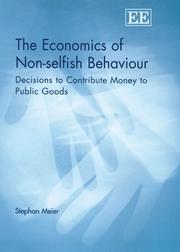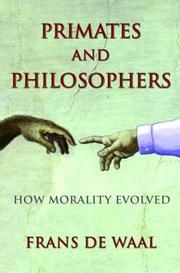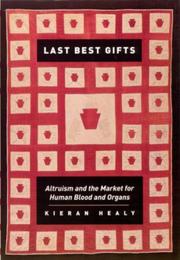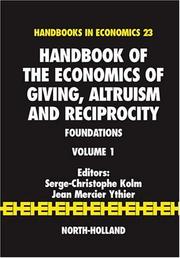| Listing 1 - 9 of 9 |
Sort by
|
Book
ISBN: 9654076950 9789654076951 Year: 2006 Publisher: Yerushalayim : Carmel,
Abstract | Keywords | Export | Availability | Bookmark
 Loading...
Loading...Choose an application
- Reference Manager
- EndNote
- RefWorks (Direct export to RefWorks)
Golden rule. --- Altruism. --- Brotherliness. --- Jewish ethics. --- Règle d'or --- Altruisme --- Fraternité --- Morale juive

ISBN: 1845424417 9781845424411 Year: 2006 Publisher: Cheltenham : Edward Elgar,
Abstract | Keywords | Export | Availability | Bookmark
 Loading...
Loading...Choose an application
- Reference Manager
- EndNote
- RefWorks (Direct export to RefWorks)
Altruism --- Helping behavior --- Public goods --- Charity --- Economic aspects --- AA / International- internationaal --- 361 --- 201 --- Openbare onderstand en weldadigheid. Menslievendheid. Sociaal hulpbetoon. --- Sociologie: algemeenheden. --- #SBIB:17H25 --- Sociale wijsbegeerte: economische orde en arbeid --- Altruïsme --- Economie: ethische en morele aspecten --- Altruïsme. --- Economie: ethische en morele aspecten. --- Altruistic behavior --- Unselfishness --- Conduct of life --- Goods, Public --- Finance, Public --- Welfare economics --- Free rider problem (Economics) --- Behavior, Helping --- Human behavior --- Interpersonal relations --- Caring --- Alms and almsgiving --- Sociologie: algemeenheden --- Openbare onderstand en weldadigheid. Menslievendheid. Sociaal hulpbetoon --- Altruism - Economic aspects --- Helping behavior - Economic aspects

ISBN: 0521852803 9780521852807 9780521617994 0521617995 Year: 2006 Publisher: Cambridge : Cambridge university press,
Abstract | Keywords | Export | Availability | Bookmark
 Loading...
Loading...Choose an application
- Reference Manager
- EndNote
- RefWorks (Direct export to RefWorks)
In direct response to indefinite delays on the national transplantation waitlists and an inadequate supply of organs, a growing number of terminally ill Americans are turning to international underground markets and brokers for organs. Offering a contemporary view of organ and tissue supply and demand, Michele Goodwin explores the legal, racial and social nuances of current altruistic institutionalized procurement schemes. It is understandably not publicized that Chinese inmates sitting on death row and the economically disadvantaged in India and Brazil are the most often compromised co-participants in the negotiation process and supply kidney and other organs for Americans as well as other Westerners willing to shop and pay in the shadow of the law. Goodwin suggests that the best alternative model for organ procurement is a market approach or one based on presumed consent and provides an alternative way of studying how to increase the supply of organs and other body parts as well.
Transplantation of organs, tissues, etc. --- Body, Human. --- Homografts --- Medical ethics. --- Tissue and Organ Procurement --- Altruism. --- Coercion. --- Ethics. --- Fraud. --- Informed Consent. --- Tissue Donors --- Corrupt practices. --- Moral and ethical aspects. --- methods. --- supply & distribution. --- legislation & jurisprudence. --- Human body. --- Transplantation of organs, tissues, etc. - Corrupt practices. --- Homografts - Moral and ethical aspects. --- Tissue and Organ Procurement - methods. --- Tissue Donors - supply & distribution. --- Tissue and Organ Procurement - legislation & jurisprudence.

ISBN: 0691141290 0691124477 9786612267659 1282267655 1400830338 9780691124476 0691169160 Year: 2006 Publisher: Princeton, N.J. : Princeton University Press,
Abstract | Keywords | Export | Availability | Bookmark
 Loading...
Loading...Choose an application
- Reference Manager
- EndNote
- RefWorks (Direct export to RefWorks)
Can virtuous behavior be explained by nature, and not by human rational choice? "It's the animal in us," we often hear when we've been bad. But why not when we're good? Primates and Philosophers tackles this question by exploring the biological foundations of one of humanity's most valued traits: morality. In this provocative book, renowned primatologist Frans de Waal argues that modern-day evolutionary biology takes far too dim a view of the natural world, emphasizing our "selfish" genes and reinforcing our habit of labeling ethical behavior as humane and the less civilized as animalistic. Seeking the origin of human morality not in evolution but in human culture, science insists that we are moral by choice, not by nature. Citing remarkable evidence based on his extensive research of primate behavior, de Waal attacks "Veneer Theory," which posits morality as a thin overlay on an otherwise nasty nature. He explains how we evolved from a long line of animals that care for the weak and build cooperation with reciprocal transactions. Drawing on Darwin, recent scientific advances, and his extensive research of primate behavior, de Waal demonstrates a strong continuity between human and animal behavior. He probes issues such as anthropomorphism and human responsibilities toward animals. His compelling account of how human morality evolved out of mammalian society will fascinate anyone who has ever wondered about the origins and reach of human goodness. Based on the Tanner Lectures de Waal delivered at Princeton University's Center for Human Values in 2004, Primates and Philosophers includes responses by the philosophers Peter Singer, Christine M. Korsgaard, and Philip Kitcher and the science writer Robert Wright. They press de Waal to clarify the differences between humans and other animals, yielding a lively debate that will fascinate all those who wonder about the origins and reach of human goodness.
Altruistic behavior in animals. --- Morale évolutive --- Altruisme chez les animaux --- Morale évolutive --- Altruistic behavior in animals --- Ethics, Evolutionary --- Primates --- Helping behavior in animals --- Altruism --- Animal behavior --- Ethics, Naturalistic --- Evolutionary ethics --- Naturalistic ethics --- Ethics --- Ethical relativism --- Behavior --- General ethics --- Ethics, Evolutionary. --- Behavior. --- Moeurs et comportement

ISBN: 9780387280318 0387280316 9780387280325 1441939164 9786610613694 1280613696 0387280324 Year: 2006 Publisher: New York, NY : Springer US : Imprint: Springer,
Abstract | Keywords | Export | Availability | Bookmark
 Loading...
Loading...Choose an application
- Reference Manager
- EndNote
- RefWorks (Direct export to RefWorks)
The topic of prosocial behavior (e.g. fairness, solidarity, and altruism) has recently shifted back into the center of attention in a variety of disciplines, ranging from economics across sociology and psychology towards biology. It is now a well-accepted fact in all human sciences that human behavior is not always governed by egotism and selfish motives. Unfortunately, this does not explain why humans also act blatantly selfish and are blind to the suffering of others. This book is a response to the quandary. It brings together leading researchers in sociology and psychology to explain human egotism and altruism using not only their area of study but also bringing in research from economics and biology. Since this work brings together the research of many different disciplines, a complete account of solidarity and prosocial behavior is presented.
Solidarity --- Altruism --- Social groups --- Solidarité --- Altruisme --- Groupes sociaux --- Psychological aspects --- Aspect psychologique --- Altruism. --- Social groups -- Psychological aspects. --- Solidarity. --- Social Change --- Sociology & Social History --- Social Sciences --- 316.32 --- 316.64 --- Globale samenlevingsvormen --- Maatschappelijke attitudes --(sociale psychologie) --- 316.64 Maatschappelijke attitudes --(sociale psychologie) --- 316.32 Globale samenlevingsvormen --- Association --- Group dynamics --- Groups, Social --- Altruistic behavior --- Unselfishness --- Psychological aspects. --- Social sciences. --- Sociology. --- Personality. --- Social psychology. --- Social Sciences. --- Sociology, general. --- Personality and Social Psychology. --- Conduct of life --- Helping behavior --- Cooperation --- Mass psychology --- Psychology, Social --- Human ecology --- Psychology --- Sociology --- Personal identity --- Personality psychology --- Personality theory --- Personality traits --- Personology --- Traits, Personality --- Individuality --- Persons --- Self --- Temperament --- Social theory --- Social sciences --- Behavioral sciences --- Human sciences --- Sciences, Social --- Social science --- Social studies --- Civilization --- Consciousness. --- Apperception --- Mind and body --- Perception --- Philosophy --- Spirit

ISBN: 0226322378 0226322351 9780226322353 9780226322377 9786612738432 0226322386 1282738437 9780226322384 9781282738430 661273843X Year: 2006 Publisher: Chicago University of Chicago Press
Abstract | Keywords | Export | Availability | Bookmark
 Loading...
Loading...Choose an application
- Reference Manager
- EndNote
- RefWorks (Direct export to RefWorks)
More than any other altruistic gesture, blood and organ donation exemplifies the true spirit of self-sacrifice. Donors literally give of themselves for no reward so that the life of an individual-often anonymous-may be spared. But as the demand for blood and organs has grown, the value of a system that depends solely on gifts has been called into question, and the possibility has surfaced that donors might be supplemented or replaced by paid suppliers. Last Best Gifts offers a fresh perspective on this ethical dilemma by examining the social organization of blood and organ donation in Europe and the United States. Gifts of blood and organs are not given everywhere in the same way or to the same extent-contrasts that allow Kieran Healy to uncover the pivotal role that institutions play in fashioning the contexts for donations. Procurement organizations, he shows, sustain altruism by providing opportunities to give and by producing public accounts of what giving means. In the end, Healy suggests, successful systems rest on the fairness of the exchange, rather than the purity of a donor's altruism or the size of a financial incentive.
Procurement of organs, tissues, etc. --- Transplantation of organs, tissues, etc. --- Tissue banks --- Dons d'organes, de tissus, etc. --- Dons d'organes, de tissus, etc --- Greffe (Chirurgie) --- Banques de tissus --- Economic aspects --- Gestion --- Aspect économique --- Altruism -- United States. --- Blood Banks -- economics -- United States. --- Blood Banks -- organization & administration -- United States. --- Procurement of organs, tissues, etc - Economic aspects - United States. --- Procurement of organs, tissues, etc. -- Economic aspects -- United States. --- Tissue and Organ Procurement -- economics -- United States. --- Tissue Banks -- economics -- United States. --- Tissue Banks -- organization & administration -- United States. --- Tissue banks - United States. --- Tissue banks -- United States. --- Tissue Donors -- United States. --- Transplantation of organs, tissues, etc - Economic aspects - United States. --- Transplantation of organs, tissues, etc. -- Economic aspects -- United States. --- Procurement of organs, tissues, etc --- Transplantation of organs, tissues, etc --- Health Services --- Social Behavior --- Biological Specimen Banks --- Persons --- Altruism --- Tissue Banks --- Tissue Donors --- Tissue and Organ Procurement --- Blood Banks --- Health Facilities --- Behavior --- Named Groups --- Health Care Facilities, Manpower, and Services --- Health Care --- Behavior and Behavior Mechanisms --- Psychiatry and Psychology --- Surgery & Anesthesiology --- Transplantation of Organs & Tissues --- Health & Biological Sciences --- #SBIB:316.334.3M30 --- #SBIB:316.334.3M50 --- Medische sociologie: gezondheidsgedrag --- Organisatie van de gezondheidszorg: algemeen, beleid --- Aspect économique --- Banks, Organ --- Banks, Tissue --- Banks, Transplant --- Organ banks --- Transplant banks --- Medical transplantation --- Organ transplantation --- Organ transplants --- Organs (Anatomy) --- Surgical transplantation --- Tissue transplantation --- Tissues --- Transplants, Organ --- Organ procurement (Surgery) --- Tissue procurement (Surgery) --- Transplantation --- Biobanks --- Health facilities --- Preservation of organs, tissues, etc. --- Surgery --- Transplant surgery --- Transplantation surgery --- Philosophical anthropology --- Professional ethics. Deontology --- Human medicine --- altruism, black market, organ donation, capitalism, commodification, human body, blood donors, gifts, benevolence, incentives, sale, sacrifice, ethics, europe, donations, procurement, organizations, red cross, fairness, justice, sociology, politics, nonfiction, economics, medicine, healthcare, transfusion, transplant, collection, exchange, tissues.

ISSN: 01697218 15740714 ISBN: 0444506977 9780444506979 9780444521453 0444521453 9786611051075 1281051071 0080478263 9786611050894 128105089X 0080478212 Year: 2006 Volume: 23 Publisher: Amsterdam : Elsevier,
Abstract | Keywords | Export | Availability | Bookmark
 Loading...
Loading...Choose an application
- Reference Manager
- EndNote
- RefWorks (Direct export to RefWorks)
316.6 --- 330.1 --- economie, ethiek --- gedrag --- inkomensverdeling --- macro-economie --- micro-economie --- ontwikkelingshulp --- psychologie, sociaal --- sociale economie --- welvaartseconomie --- Gedragstheorie. Sociaal gedrag. Sociale psychologie --(gedrag en zelfconcept van het individu in de groep z.o. {159.923.33}) --- Economische grondbegrippen. Algemene begrippen in de economie --- Economics --- -Altruism --- -Charity --- Voluntarism --- Gifts --- Economic assistance --- Economic aid --- Foreign aid program --- Foreign assistance --- Grants-in-aid, International --- International economic assistance --- International grants-in-aid --- Economic policy --- International economic relations --- Conditionality (International relations) --- Donations --- Presents --- Generosity --- Manners and customs --- Free material --- Voluntary action --- Volunteer work --- Volunteering --- Volunteerism --- National service --- Associations, institutions, etc. --- Alms and almsgiving --- Altruism --- Benevolence --- Conduct of life --- Theological virtues --- Altruistic behavior --- Unselfishness --- Charity --- Helping behavior --- Economic theory --- Political economy --- Social sciences --- Economic man --- Sociological aspects --- Economic aspects --- 330.1 Economische grondbegrippen. Algemene begrippen in de economie --- 316.6 Gedragstheorie. Sociaal gedrag. Sociale psychologie --(gedrag en zelfconcept van het individu in de groep z.o. {159.923.33}) --- Microeconomics --- Distributive justice --- Charity. --- Voluntarism. --- Gifts. --- Economic assistance. --- Economie politique --- Charité --- Bénévolat --- Cadeaux --- Aide économique --- Sociological aspects. --- Aspect sociologique --- ELSEVIER-B EPUB-LIV-FT --- Economics - Sociological aspects --- Industrie distributive --- Altruisme --- Interaction sociale --- Générosité --- Famille --- Relations intergénérationnelles --- Aspects économiques

ISBN: 0822337576 0822337703 9780822337706 Year: 2006 Publisher: Durham ; London : Duke university press,
Abstract | Keywords | Export | Availability | Bookmark
 Loading...
Loading...Choose an application
- Reference Manager
- EndNote
- RefWorks (Direct export to RefWorks)
#SBIB:316.334.3M51 --- Organisatie van de gezondheidszorg: modellen van therapeutisch handelen --- Tissue banks --- Organ preservation (Anatomy) --- Banks, Organ --- Banks, Tissue --- Banks, Transplant --- Organ banks --- Transplant banks --- Biobanks --- Preservation of organs, tissues, etc --- Tissue Donors --- Health facilities --- Preservation of organs, tissues, etc. --- Procurement of organs, tissues, etc. --- Organs (Anatomy) --- Transplantation of organs, tissues, etc. --- Economic aspects --- Moral and ethical aspects --- Political aspects --- psychology --- Preservation --- United Kingdom. --- United States. --- Great Britain --- Isle of Man --- Altruism --- Capitalism --- Cross-cultural comparison --- Social Responsibility --- Tissue and Organ Procurement --- Economic aspects. --- Moral and ethical aspects. --- Political aspects. --- economics --- organization & administration --- Psychology --- Economics --- Organization & administration --- Tissue banks - Economic aspects --- Tissue banks - Political aspects --- Tissue banks - Moral and ethical aspects --- Preservation of organs, tissues, etc - Economic aspects --- Preservation of organs, tissues, etc - Political aspects --- Preservation of organs, tissues, etc - Moral and ethical aspects --- Droit médical
Book
ISBN: 0822388049 Year: 2006 Publisher: Durham : Duke University Press,
Abstract | Keywords | Export | Availability | Bookmark
 Loading...
Loading...Choose an application
- Reference Manager
- EndNote
- RefWorks (Direct export to RefWorks)
A cultural studies account of how the "bio-value" of blood, stem cells, organs, and cell lines moves back and forth between 'gift' and 'commodity'.
Embryonic Structures --- Cells, Cultured --- Transplantation --- Cells --- Blood --- Commerce --- Models, Statistical --- Health Services --- Dehumanization --- Art --- Persons --- Morals --- Research --- Economics --- Social Behavior --- Political Systems --- Culture --- Organization and Administration --- Health Facilities --- Jurisprudence --- Intellectual Property --- Fetus --- Biomedical Research --- Altruism --- Cross-Cultural Comparison --- Fetal Blood --- Human Body --- Patents as Topic --- Social Responsibility --- Commodification --- Models, Economic --- Tissue and Organ Procurement --- Capitalism --- Biological Specimen Banks --- Organ Transplantation --- Ownership --- Tissue Donors --- Cell Line --- Embryo, Mammalian --- Stem Cells --- Gift Giving --- Surgical Procedures, Operative --- Health Care Facilities, Manpower, and Services --- Anatomy --- Social Sciences --- Hemic and Immune Systems --- Anthropology, Cultural --- Statistics as Topic --- Health Services Administration --- Models, Theoretical --- Behavior --- Humanities --- Science --- Social Control, Formal --- Body Fluids --- Sociology --- Named Groups --- Technology, Industry, and Agriculture --- Ethics --- Analytical, Diagnostic and Therapeutic Techniques and Equipment --- Epidemiologic Methods --- Anthropology, Education, Sociology and Social Phenomena --- Investigative Techniques --- Technology, Industry, Agriculture --- Health Care --- Behavior and Behavior Mechanisms --- Fluids and Secretions --- Anthropology --- Philosophy --- Health Care Evaluation Mechanisms --- Natural Science Disciplines --- Quality of Health Care --- Health Care Economics and Organizations --- Psychiatry and Psychology --- Public Health --- Disciplines and Occupations --- Environment and Public Health --- Health Care Quality, Access, and Evaluation
| Listing 1 - 9 of 9 |
Sort by
|

 Search
Search Feedback
Feedback About UniCat
About UniCat  Help
Help News
News